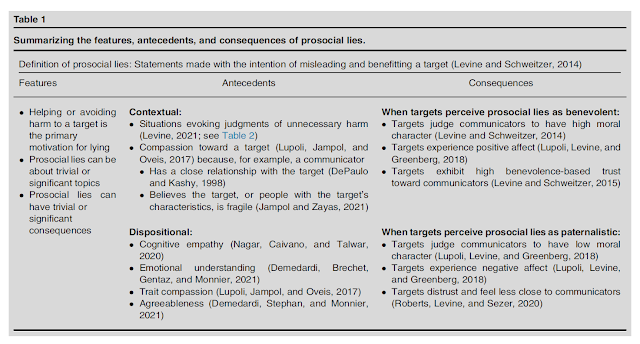When is lying acceptable?
We value honesty and condemn cheating. Understandable, because honesty has many benefits and lies and deceit can do a lot of damage. At the same time, we realize that no one is always completely honest. Everyone lies now and then. And I'm not even talking about hiding what you think or saying something that is true yet misleading. I'm talking about consciously saying things that we know are not true. And we all do this from time to time. Why do we do that? And when is it acceptable to lie? Emma Levine and Matthew Lupoli explain this clearly in a new article.
We condemn harmful lies
The general norm is to value honesty and condemn cheating. We prefer that we be honest with other people and we understand that others want us to be honest with them.
It is important to mention that the condemnation of lies mainly refers to harmful lies: lies that disadvantage others. They aim to gain benefit for oneself at the expense of the other. We prefer to avoid people who use harmful lies as much as possible.
Prosocial Lies
There is also another type of lie that is less often condemned: prosocial lies. Prosocial lies involve a conflict of moral values. The goal of being honest competes with something else we also care about, which is to help others. We therefore often speak of white lies. You lie for the (supposed) interest of the other person.
In the table below Levine & Lupoli summarize what is known so far about prosocial lies:
In which situations are lies acceptable?
In a following table the authors discuss situations in which lying is more acceptable to avoid unnecessary harm to the person being lied to.
Conclusion
We can continue to value honesty. But at the same time, we can understand that honesty is not always desirable and that dishonesty is not always unacceptable. Honesty is not the only value in life that we want to uphold. In many situations we strive not only for honesty but also for other things that are worthwhile, such as wanting to help other people and avoiding unnecessary suffering.



Comments
► Research on hypocrisy: This study examines why hypocrisy is common in our personal, professional and political lives, despite its known negative consequences. The researchers argue that hypocritical moral absolutism is preferable to admitting moral flexibility because of the associated social costs. They conducted six studies with 3,545 participants on honesty and found that people who admit flexible positions on honesty (e.g., "It's sometimes okay to lie") are punished more than people who hypocritically hold absolute positions on honesty (e.g., "It's never okay to lie") but don't always adhere to them. Although most people do not hold absolute positions against deception, they trust communicators with absolute honesty positions more than those with flexible honesty positions. This is because they see absolute stances as reliable indicators of future honesty even if the communicator has exhibited inconsistent behavior. The study also shows that communicators, including U.S. government officials, are aware of the social costs of moral flexibility. This research helps to better understand the psychology of honesty and the persistence of hypocrisy in our society.